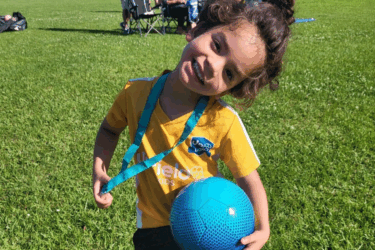“I realized I could advocate for a child without becoming a lawyer, and that’s pretty awesome!” Meagan Harrison, CASA volunteer for eight years, exclaims.
You’ve probably heard about CASA on the radio during their playhouse giveaway or maybe on a billboard, but you may have no idea what the advocates actually do. The truth is, this organization represents the most vulnerable and overlooked lives in our city, foster children. Court Appointed Special Advocates are professional volunteers who dedicate their time and energy to abused children. They work directly with DCFS caseworkers, attorneys, foster parents, families, and of course, the children, to recommend the best permanent home for that child.
CASA was founded in 1992, and since then, 1,200 community volunteers have provided a voice for 2,600 abused children. These children with a CASA volunteer receive more services while in foster care, are less likely to re-enter foster care, and are more likely to be adopted. Meagan explains how valuable the advocate is, not only for the child, but for the entire Child Protective Services system, “We are the boots on the ground. We can be places and collect data that the caseworkers may not be able to do, and then we work as a team with the caseworkers so that no child slips through the cracks.” Liz Betz, Executive Director for 24 years, agrees, “DCFS has huge caseloads, whereas a CASA volunteer is assigned to one case. Before CASA comes along, these children have already been through something horrible, and have been removed from their home, which is so traumatic.”
Building relationships with kids who have experienced trauma is only one of the many responsibilities of CASA volunteers. After orientation, the volunteer goes through a 30-hour classroom course, then a two-hour court observation, an interview, and numerous background checks. Once they are cleared to take a case, they are assigned to one of four supervisors who go to court with the volunteers and work one-on-one with them throughout a case.
Meagan has worked on six cases in her time with CASA and has this process down to a science. Once a case becomes available with their chosen demographic, their supervisor calls and provides a little information about the case so the volunteer can accept or decline. If they accept, then they meet with the supervisor to go over the case with the confidential documents. Then, they make an action plan to contact the caseworker to review the file, contact the child’s guardians, and meet the child to get their point of view. After these initial steps, the advocate volunteer conducts interviews with everyone involved to complete the big picture of what is best for the child. They write a court report in addition to verbal recommendations. They summarize the state of the child and suggest their recommendations.
“Our advocates are lay volunteers appointed by a judge to give recommendations for the best interest of the children. A lot of people don’t realize how serious it is what we do. These families are in crisis, but you have to come back to permanence and focus on long term for the child,” Liz emphasizes. CASA volunteers must keep in mind that “foster care is designed to be a temporary solution. The whole purpose of Child Protective Services is to get children into safe, permanent homes. It requires some strategy to stay focused and that’s why the supervisor and volunteer work together on that strategy.”
Although much is required of CASA volunteers, Meagan believes it is all worth it. She shares, “It has increased my empathy for social workers, children in the state’s custody, for the parents that may lack resources, the families of children, foster parents, the attorneys. Now I fully understand the process and all the entities involved.” She beams with passion as she discusses her role at CASA. She loves to work with teenagers and build rapport with them. She enjoys giving the children time to vent and verbalize their feelings. She asks them where they want to live, and “if it’s a positive desire, I try to make it happen through the image that I paint in the court report.”
With this level of dedication, the one difficulty in volunteering is when a judge does not follow the recommendation. “It’s a hard pill to swallow because you go home with these negative feelings that you did not do all you could for the child,” Meagan says. Liz and her team advise the advocates during training that their recommendations may not be followed, but it does not mean their hard work is for naught.
The CASA staff recruits, screens, trains, and supervises 80 hardworking volunteers at any given time. Liz shares how the organization has evolved, “When the board hired me, their goal was a volunteer for every foster child in East Baton Rouge Parish. There were 12 volunteers serving 24 children in 1992. In 2009, we hit that mark, a CASA for every child. We have served every child since 2009.” Though they have been operating near their desired mark recently, the August flood has impacted their field of advocates. “We are really struggling to have enough volunteers right now. We need volunteers from all walks of life. Right now, we particularly need African American volunteers. It’s very rewarding work, and no special skills are needed. We teach you what you need to know.” Meagan implores that people who have time should come to orientation just to see what they can offer.
Liz stresses, “There is no more important thing for children than a safe permanent home. For every child that we can move out of foster care and into a permanent home, hopefully they are going to have a greater chance of being a productive member of this community.” ■




